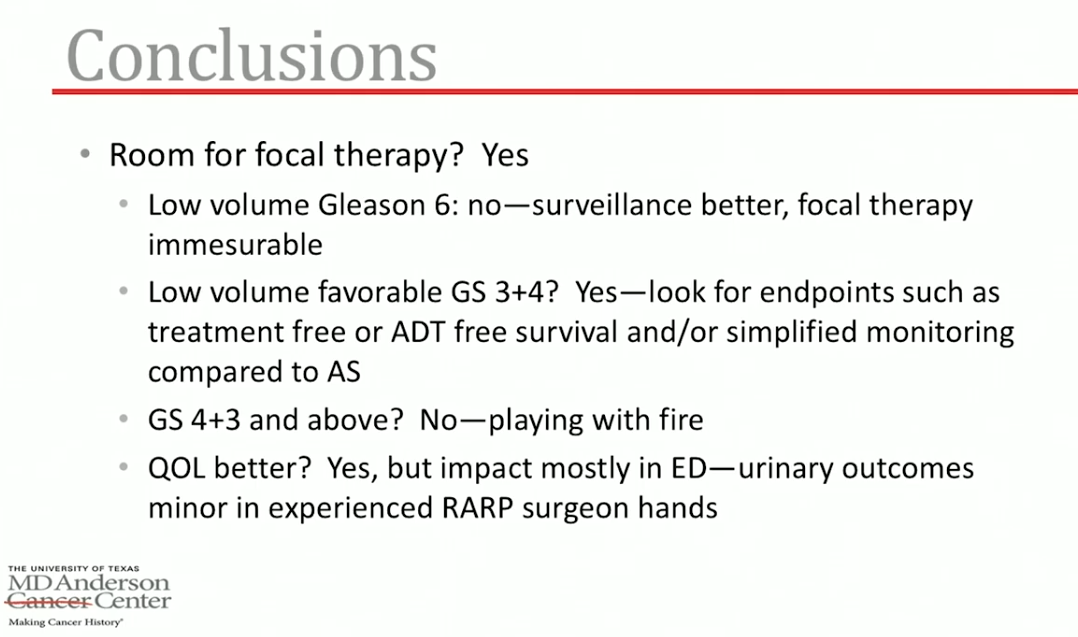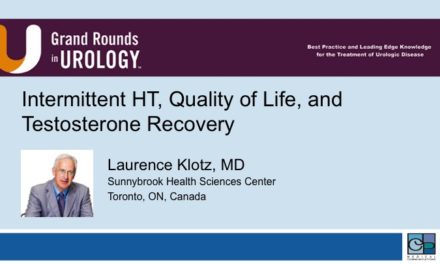John W. Davis, MD, FACS, presented “Prostate Cancer Focal Therapy: Is it the Right Time for your Practice?” during the 23rd Annual Innovations in Urologic Practice on September 14, 2018 in Santa Fe, New Mexico.
How to cite: Davis, John W. “Prostate Cancer Focal Therapy: Is it the Right Time for your Practice?” September 14, 2018. Accessed Nov 2025. https://grandroundsinurology.com/prostate-cancer-focal-therapy-is-it-the-right-time-for-your-practice/
Prostate Cancer Focal Therapy: Is it the Right Time for your Practice? – Summary:
John W. Davis, MD, discusses the benefits and limitations of focal therapy for prostate cancer. He describes ways in which focal therapy can be a middle ground between active surveillance and standard therapies, as well as identifying appropriate candidates for this approach.
This is a partner presentation coupled with Jeffrey A. Jones’s “The Pros of Focal Therapy for Prostate Cancer.”
Abstract:
Compared to previous years, urologists better understand focal therapy for treating prostate cancer in 2018. Patients may or may not encounter the option via internet searches. The AUA does not recommend focal therapy outside of a research protocol due to lack of comparative evidence. One can argue focal therapy induces improved quality of life compared to other intervention methods. There may be merit to the notion of focal therapy being an “adjuvant” therapy to active surveillance. In other words, focal therapy could be a middle ground between active surveillance and standard treatments.
However, imaging precision remains the major rate limiting step, as MRI is mostly an estimate of tumor location and grade. Focal therapy remains precisely defined in terms of relative amount of tissue treated and/or ideal energy source. There is a lack of comparative literature regarding this approach, as well as a lack of robust data on the outcomes of cases requiring salvage therapy.
Finally, patients who benefit are almost exclusively favorable volume Gleason 3+4. Patients with less aggressive disease are better candidates for active surveillance. Conversely, it is appropriate for patients with more aggressive disease to continue with standard therapies. Patients should be aware that post-focal therapy will still require imaging, repeat biopsies, PSA metrics, and they may have reduced quality of life with salvage therapies compared with primary standard outcomes.
About Innovations in Urologic Practice
Innovations in Urologic Practice (IUP) is an annual CME-accredited conference devoted to updating urologists on the rapidly changing healthcare environment. Topics focus on innovative diagnostic and treatment strategies, controversies, new and currently developing technologies, and challenges in today’s urologic practice. Dr. Davis presented this lecture during the 23rd IUP in 2018. Please visit this page in order to learn more about future IUP meetings.
ABOUT THE AUTHOR
John W. Davis, MD, is a Professor of Urology and Director of the Urosurgical Prostate Program at the University of Texas MD Anderson Cancer Center in Houston. He received his BS in Biology at Davidson College in North Carolina in 1990. He then went on to earn his medical degree at the University of Virginia in 1994 and completed his residency training at Eastern Virginia Graduate School of Medicine in Norfolk. Dr. Davis had fellowship training in prostate cancer research in the Department of Microbiology and Molecular Cell Biology at Eastern Virginia Medical School, and received an American Foundation of Urologic Disease Scholar award for proteomic applications in prostate cancer biomarkers. He completed a Clinical Fellowship in Urologic Oncology at the MD Anderson Cancer Center, and a Fellowship in Laparoscopic Urology at Charité Hospital in Berlin, Germany, under the mentorship of Ingolf Tuerk.
Dr. Davis’ clinical interests include patients with urologic cancers, laparoscopic/robotic surgery, and general urology. His academic interests include quality of life after prostate cancer treatment, outcomes for robotic radical prostatectomy, high-risk prostate cancer trials, active surveillance for prostate cancer, and development of robotic surgical techniques for invasive bladder cancer. He has participated as an investigator in several Southwest Oncology Group and industry-sponsored clinical trials.






